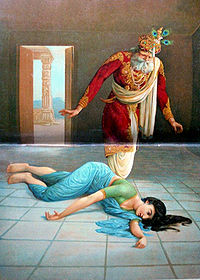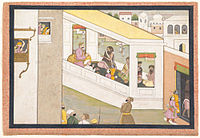- Dasharatha
-
Dasharatha (Sanskrit: दशरथ, IAST Daśaratha, Tibetan: ཤིང་རྟ་བཅུ་པ, Khmer: Dasarath, Malay: Dasarata, Burmese: Dasagiri, Yuan: Dattaratthah, Tamil: Tiyataran, Thai: Thotsorot, Lao: Thotarot, Chinese: 十车王)[1][2] was a king of Ayodhya of the Ikshvaku dynasty whose life story is narrated principally in the Hindu epic Ramayana. He was a descendant of Raghu and was the father of Rama, the heroic prince of the Ramayana and an Avatara of the god Vishnu according to Hindu tradition. Dasharatha had three wives namely, Kaushalya, Sumitra and Kaikeyi. Rama was the son of Kaushalya, Lakshman and Shatrughna were the sons of Sumitra, and Bharata was the son of Kaikeyi.
Dasharatha had a daughter, Shanta, by his wife Kaushalya. She was the eldest of all his children and married to Rishi Shreengi.
Ramayana
Four key events in the life of Dasharatha are described in the Ramayana:
- On hearing the great tales of Dasharatha, the demon king Ravana - whose ambition was to rule the three worlds - was filled with envy and sent messengers to the court of Dasharatha asking the king to pay homage and tribute to Ravana or face war. Dasharatha shot off arrows and told the messengers that, on their return, they would find the gates of Ravana's capital Lanka fastened shut by the arrows.
- Dasharatha was famous for his ability to hunt blind, by sound alone. During one of his hunting expeditions, he heard a noise resembling an elephant drinking water, and shot an arrow in that direction. To his chagrin, he found that he had instead shot the young boy Shravan Kumar. In his grief, the boy's mother cursed the king that he too would one day suffer putrasoka (grief of separation from one's progeny) just like she and her husband were suffering. The couple then gave up their lives, not wanting to live after consuming water offered by their son's killer.
- Dasaratha, as a young man, joined the side of the gods in a war against the Asuras. He and his chariot were hit, he was bleeding badly, and his chariot was damaged. Kaikeyi came to his rescue and guided him to safety in his chariot. Upon seeing that she had saved his life, Dasaratha promised Kaikeyi two boons, to which she replied, "My joy is great enough that you still live. What do I want but your love from you my Lord? Keep the two gifts til I ask."
- These incidents in Dasharatha's life played havoc in the future course of events. By performing the Putrakameshti sacrifice to obtain children, Dasharatha was blessed with four sons. When the boys were grown, Dasharatha decided to retire and anoint Rama, the eldest, the crown prince. But before the ceremony took place, the ambitious Kaikeyi asked him to make good the old promise. She demanded for the first boon that her son Bharata be crowned king instead of Rama, and for the second that Rama leave Ayodhya and live in exile for 14 years in forest. The helpless king had to agree to her demands because as a Kshatriya by Dharma, he could not go back on his word. The dejected Dasharatha died of grief not long after Rama had gone into exile, unable to withstand the anguish of separation from his son. This also fulfilled the curse of Shravan Kumar's mother.
References
- ^ Singaravelu Sachithanantham (2004), The Ramayana Tradition in Southeast Asia, Kuala Lumpur: University Malaya Press, ISBN 983-100-234-2
- ^ 印度两大史诗研究, ISBN 7-301-04897-1
Ramayana by Valmiki Ikshvaku clan Vanara Rakshasa Ravana · Vibhishana · Kumbhakarna · Indrajit · Akshayakumara · Atikaya · Kabandha · Khara · Mandodari · Maricha · Mayasura · Prahasta · Subahu · Sulochana · Sumali · Surpanakha · Tataka · ViradhaSages Agastya · Ahalya · Arundhati · Bharadwaja · Kambhoja · Parashurama · Vasistha · Vishvamitra · RishyasringaOther characters Places Other Lakshman Rekha · List of adaptationsHindu deities and texts Gods 
Goddesses Texts Categories:- Members of the Ikshvaku clan in the Ramayana
- Sanskrit words and phrases
- Kosala
Wikimedia Foundation. 2010.


